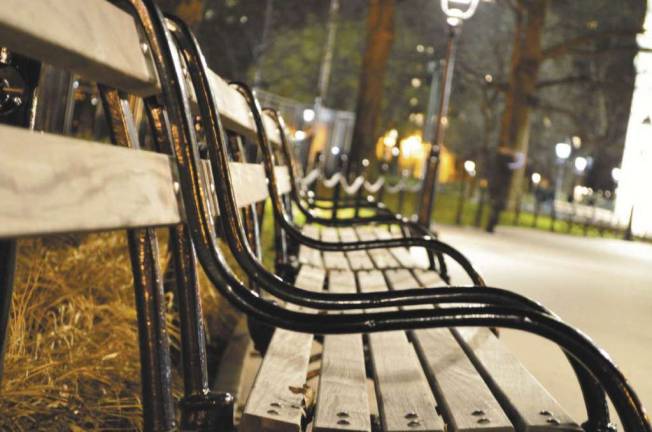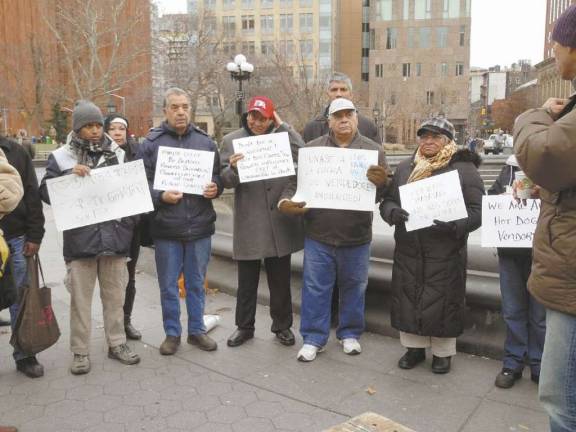Fighting for the Soul of Washington Square Park


Some fear the possibility of the famous park becoming privatized
Fans of one of the city's most iconic parks are concerned that a newly created Washington Square Park Conservancy will exert undue private control over a public space known for its laid-back, gritty atmosphere.
People who flock to Washington Square Park do so to revel in the pocket of nature in the West Village, for sure, but also to watch unlicensed street performers, take a snooze on a shady bench, engage in people-watching of the most varied order and sometimes sneak sips from brown paper bags or follow plumes of sweet-smelling white smoke. It's a park for students, drifters, skateboarders, tourists and New Yorkers of all stripes, and many want to keep it that way.
Historically, when conservancies pop up for NYC parks, the results can be beneficial, but also bring some complaints. A 2010 report by Harvard Law School said that private groups participate in the management of half of the city's 1,700 public parks.
According to the study, "This 'privatization' has generated criticism. The manager of Central Park, for example, was severely criticized for refusing to allow a protest during the Republican National Convention, and instead protecting the grass of the Great Lawn. Bryant Park's management similarly has been criticized for commercializing its park by hosting fashion shows to raise revenue."
Such conservancies have also been praised as protectors and preservers of public space.
"Historians have hailed the Central Park Conservancy, for example, as the long-awaited 'protector' of the park, and the Wall Street Journal has complimented the renovated Bryant Park as the most 'urbane' space in the city."
Swan's referring to the non-profit application the conservancy filed with the IRS, which projects fundraising revenue in the hundreds-of-thousands of dollars in the coming years and includes the ability to award an up to $25,000 bonus for its executive director, who is a parks department employee.
The conservancy's bylaws, which were made available to The Villager newspaper and posted on their website, calls for a board of anywhere between three and 25 members who will vote on a wide range of initiatives at the park. The conservancy's executive director is Sarah Neilson, the parks department's administrator for Washington Square Park.
Swan said the community has resisted pressure to form a conservancy at Washington Square Park for the past 12 years, but that this attempt was successful because of the way it was presented to residents and the community board by the four founding members.
"They may in their minds think they're insuring the future of Washington Square Park," said Swan, "but they also have to know what subsequently comes with those conservancies, which is there's always more commercialization and privatization and private money gets to influence what happens at those parks."
A major issue for Swan is the relationship between the parks department and the conservancy. In their pitch to Community Board 2 and residents, founding members Betsey Ely, Gwen Evans, Veronica Bulgari and Justine Leguizamo stated they would have no formal agreement with the parks department, including a crucial licensing agreement whereby the parks department could shift operational and maintenance duties over to the conservancy.
However, Swan recently obtained emails through a freedom of information request that showed the conservancy's Evans, in an email to Neilson, saying, "We look forward to agreeing [to] a license agreement with the City. [...] We will make sure that the [conservancy's] bylaws are changed before the license agreement is executed so that should not be a concern."
In an interview with the Villager, the conservancy's Ely said Evans' email to the parks department was a joke and taken out of context. Neither Ely nor any other conservancy members responded to requests for comment from Our Town Downtown.
Swan points to another sign of what she considers the conservancy changing the nature of the park - the city recently decided not to renew licenses for two hot dog vendors that expired at the end of December. Critics of the decision believe it was really made by the conservancy in an effort to attract more cultured - and pricier - food options to the park.
Geoffrey Croft, President of NYC Park Advocates, said he received calls from angry parks department employees who said Ely made the decision to move the hot dog vendors out of Washington Square Park, contradicting the department's official stance.
Phil Abramson, a spokesperson for the parks department, denied this and said, "The parks department is definitely retaining all management and control of Washington Square Park."
Like Swan, Croft believes the conservancy could eventually have real power over Washington Square Park backed by its fundraising efforts.
"I don't think anyone is against people helping out, as long as that's what it is," said Croft. "But generally people don't get into this without wanting some degree of decision making power."